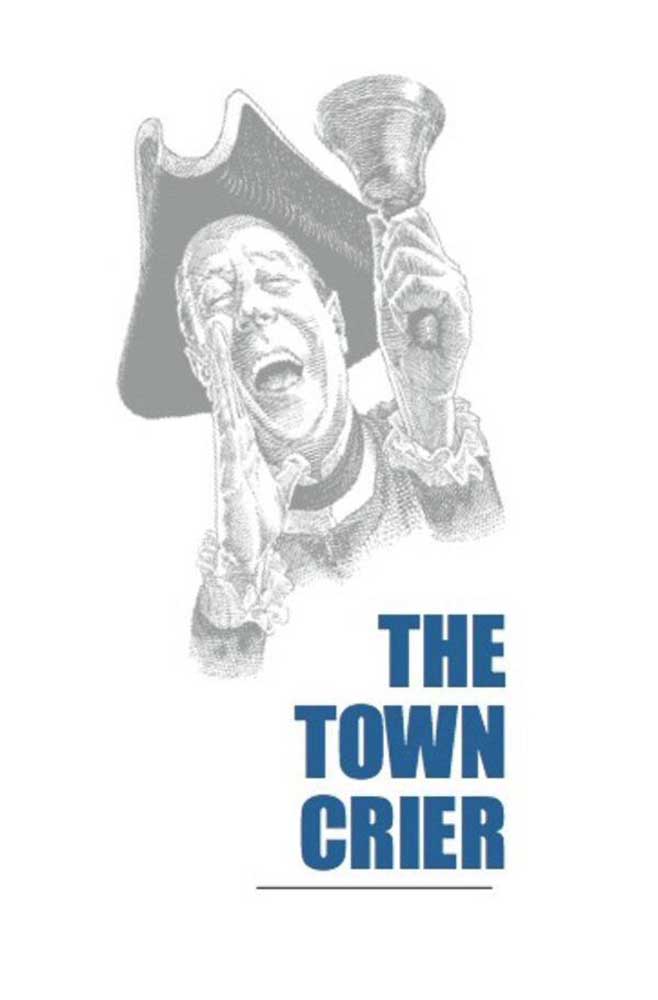The Town Crier: Snake oil
Published 11:00 am Sunday, December 10, 2023

- The Town Crier
The term “snake oil” shows up in America as a folk remedy as early as the 1850s, where the oil from snake fat, especially rattlesnakes, was said to cure various ills.
In Georgia it was said to remedy gout and rheumatism. In Pennsylvania it was said to cure deafness. Those Northerners are soooooo gullible.
Trending
Gradually, pharmacists and others started to push back against various snake oil products, not because they didn’t work (they mostly didn’t), but because they didn’t actually have snake oil in them. Actual snake oil has been used for centuries in China for things like arthritis, and it has a high Omega-3 level which is beneficial. It’s thought that as the Chinese immigrants came to the West Coast they brought the remedy with them. After that, the idea of snake oil was applied to rattlesnakes as the American version. These types of treatments were also known as patent medicines.
‘Good for what ails you’
The term patent medicine was used in England and America and was the name of all types of “good for what ails you” products that were sold with no government controls back then. Patent then meant more like a registered name, not patent as we think of it today. Among the old-time patent medicines popular in the 1700s in England was Daffy’s Elixer. Developed in the 1600s by a Reverend Daffy, it was a mix of brandy and various seeds and spices and worked mainly as a laxative. It continued to be popular into the 1800s in both Britain and the U.S.
The Town Crier will now make a side argument for the word and meaning of daffy which of course gave the cartoon character Daffy Duck his name. In researching the origin of the word daffy and its current meaning, I assumed I was going to cross reference Daffy’s Elixer. Instead, I found a long-winded argument based on theory and argumental assumptions that the word daffy came from daft and deft, daft meaning kinda crazy and deft meaning good at something.
I was disheartened by the fact that those two words went back to the Middle Ages and so daffy couldn’t have been a name the common folk came up with after watching how people acted after partaking a little too much of Daffy’s Elixer. Who is the local Town Crier to challenge the experts of academia?
I did one last search to see when daffy first showed up in print in its popular meaning. Ah-ha! According to what I found, it showed up not in the late Middle Ages but in 1884. Therefore, the Town Crier posits that daffy came from Daffy’s Elixer and came into usage from the people, and that the daft/deft professional theory is incorrect. As they say in sassy internet memes, prove me wrong. Now, back to your regularly scheduled article.
Trending
‘Secret ingredients guaranteed to get results’
Because the snake oils, panaceas, elixirs, tonics, nostrums and liniments went unregulated until 1906 here in America, they were usually fairly useless, sometimes mildly effective, occasionally harmful (one had turpentine in it) and frequently used “secret ingredients guaranteed to get results,” with ingredients like cocaine, morphine or alcohol, which were legal then.
In one case, a Southern entrepreneur tested various ingredients to see what helped workers keep going in the hot, summer weather. He discovered a tea of sorts made from cayenne pepper helped you work longer because it seemed to open up the pores and allow your body to stay cooler. His idea was to basically sell colored water stating it was a “Hot Weather Work Elixir” and after you bought the bottle with the “secret ingredients” all you had to do to activate it was to add cayenne pepper.
These “bottles of health” were sold as medicines, sometimes for a specific malady and sometimes for basically anything that was wrong with you. Small troupes of sales folk would travel the countryside putting on “medicine shows.” These shows had entertainment components in them to draw a crowd and then the medicine was pitched.
In the Western films these shows are frequently portrayed, and in many the traveling group will have a “plant” in the crowd who pretends to have something wrong with them. After the shill buys the first bottle and demonstrates a miraculous and immediate “cure,” the crowd rushes the stage to buy up the bottles. The show usually packs up and skips town before the folks discover they’ve been duped.
It turns out that these traveling shows and entertainers at the end of the 1800s led into “variety” entertainment and vaudeville, which became the premier entertainment in America until the rise of movies and radio. Famous entertainers like Houdini started in medicine shows.
Vaudeville performers, of course, moved into movies, then to television and so when you’re watching shows like “Dancing With the Stars,” “The Voice” and “America’s Got Talent,” remember, these shows trace their roots back to the medicine shows, which in turn came about because of the snake oils being sold.
Originally, snake oil was considered a good thing. How the phrase, as well as the pejorative “snake oil salesman,” meaning someone who is conning you, came to be a common negative actually occurred because of a court case in 1917 when it was proved that Stanley’s Snake Oil contained no actual snake oil. It was such a disappointment to the public that the negative connotation was sealed.
There are a still a few leftovers from the snake oil days, with products like Luden’s Cough Drops, Fletcher’s Castoria (aka Fletcher’s Laxative) and Angostura Bitters (now used as a drink mixer, originally pitched as a stomach treatment), proving that some of the elixirs sold did have some useful ingredients. 7 Up, Dr Pepper and Coca-Cola were originally pushed as health products, but have since become popular soft drinks, this after the coca (coca leaves where cocaine comes from) was removed from the ingredients list of Coca-Cola. In one case an opium ingredient was changed but the replacement chemical down the line, acetanilide, was also shown to have negative effects. But acetanilide had a metabolizer in it from which acetaminophen comes, aka Tylenol.
Local history
Well, our local citizens from days before were never slouches when it came to business and so, yes, our area ties into snake oil history. Looking again at that little town that came and went in the southeast corner of Whitfield County, Tilton, we come to a character that may very well have invented junk mail. Tilton was born of the railroad as it came through our area and was important enough to have a couple of small battles there and the chase for The General locomotive to have all occurred there. After the war, in 1877, H.H. Green, make that Dr. H.H. Green, began selling a “cure” for dropsy. Dropsy is the old name for edema or swelling due to fluid buildup. Think tennis elbow or congestive heart failure.
When you ordered the “cure” you received six large black balls and six small black balls, and sometimes a tonic tablet. (I don’t know if you swallowed the balls like pills or dropped them in water and drank them down.) The ingredients in the medicinal “balls” and tablets that you purchased included squill, a flowering plant that grows from a large bulb and comes from the Mediterranean region. It is used as a poison and a medicine. When dried, the toxicity disappears and it was used by the ancient Egyptians as far back as the 16th century B.C. Hippocrates, the ancient granddaddy of doctors, used it to treat jaundice and asthma. Another ingredient Green utilized was iron sulphate, which helps with anemia.
In those days, sales mailers were sent to specific people, but Green’s innovation was to address it to a person but include on the address “or any Minister of the Gospel” so it would go to somebody and not get returned or tossed. Hopefully the minister would know someone in his congregation that had dropsy and pass this on to them. The postcard-type flier stated in large letters “Dropsy Treated Free” and “Cures Dropsy in Its Various Forms.” Below that the product was described as a harmless vegetable formula and even further below you saw only 10 days worth of treatment was free. For a total cure, you needed 30 to 60 days of treatment. Green did so much mail order business that the Tilton Post Office couldn’t handle it. The cards and shipments were put on the train to be marked onboard or perhaps in Dalton.
Green had three sons who also became doctors. Two attended the Georgia College of Eclectic Medicine and Surgery. I’m not sure I want a doctor with an eclectic medical skill set.
Green and his sons relocated the business to Atlanta for many years. Green passed away after amassing a fortune of roughly $200,000 in 1896 ($7.3 million today), and his sons kept the business going, although they had to change the phrase from “cures dropsy” to “treats dropsy.” The business eventually returned to our area with Thomas Green buying out the company and moving it to Chatsworth by 1920.
Looking for a good snake oil to treat your dropsy? No need to look further than Tilton or Chatsworth.
Mark Hannah, a Dalton native, works in video and film production.





